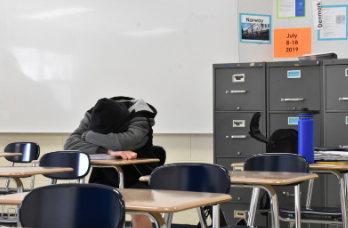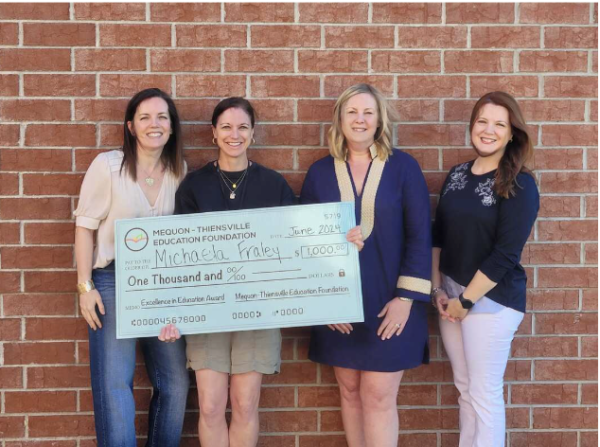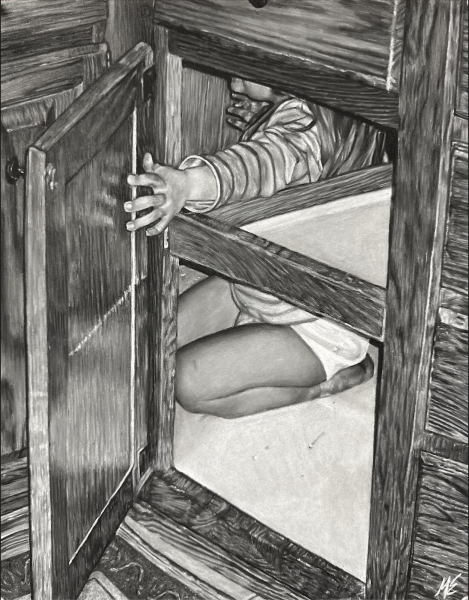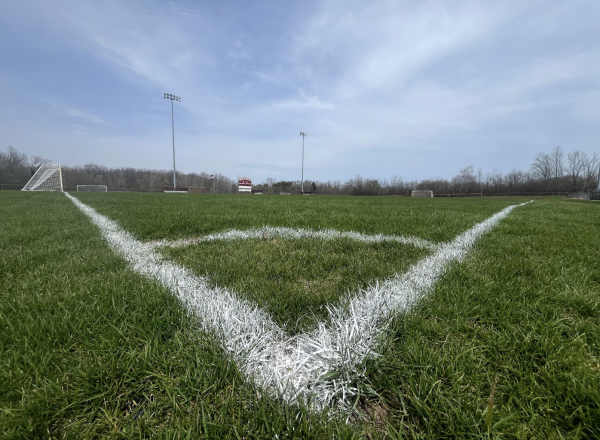Sleep: A lacking necessity

Sleep deprivation can make it a challenge to stay awake in class.
Awake too early, asleep too late. Many teens today suffer from sleep deprivation, a chronic lack of sleep. Analysis of Youth Risk Behavior Surveys from 2015 by the Center for Disease Control and Prevention found that 72.7% of high school students receive inadequate sleep.
A survey of 100 Homestead students indicates this problem is a reality at Homestead. In the survey, 65% of respondents say they do not feel they get adequate sleep. Students reported that 40% of them receive between four to six hours of sleep and 45% reportedly receive between six to eight hours of sleep.
Eight to ten hours of sleep is the recommended number for teens, an apa.org article states, yet only 7% of student respondents at Homestead report receiving eight to ten hours of sleep. This produces a population of sleep-deprived students.
Students’ lack of adequate sleep is well known by the faculty at Homestead, “Sleep deprivation effects most high school students, regardless of what school they attend,” Mary Beth O’Brien, Homestead school psychologist, said. “I do have a few students I notice that look tired on a regular basis.” Wolfgang Recht, mathematics teacher, stated.
Emma Day, senior, described her average sleep schedule as “I go to bed at midnight and wake up at 5:45 – 6 a.m.” Some students’ sleep schedules are far different than Day’s. “I usually try to go to bed, to be in bed, at ten but I usually fall asleep at 3 a.m.,” Lucas Matocky, junior, said.
This is much below the recommended eight to ten hours of sleep, affecting all aspects of life.
Sleep deprivation has numerous effects, and the results of a lack of sleep can be serious. “It’s a huge problem. What it means is that nobody performs at the level they could perform,” William Dement, MD, PhD, stated, in an article from Stanford’s Medical Center. This limits academic performance and affects grades.
There is some disagreement about the seriousness of sleep deprivation effects on academics. There is evidence that teens do better on standardized test with seven hours of sleep, instead of the recommend eight to ten, a Brigham Young University study on healthland.time.com stated.
Effects of sleep deprivation are evident in classes. “Sleep-deprived students tend to be disengaged and do not perform as well as others on tests and quizzes,” Recht stated.
Long-term learning is also hurt by a lack of sleep “This can affect a student’s ability to attend to instruction and concentrate. That then has a direct correlation with a student’s ability to retain and retrieve information in their working memory,” O’Brien said.
Effects of sleep deprivation are very familiar to some students of Homestead. When asked about receiving around six hours of sleep a night, “For the first, at least, two hours of the day I’m super tired, so, that doesn’t help, I’m tired a lot,” Day said.
Sleep deprivation can affect the social lives of students as well. “Sometimes when people want to hang out, I’m just like ‘nah’. Yesterday my friend wanted me to come pick him up and I was like ‘Timmy, I’m not driving you,’” Matocky said.
This is of serious concern to students and their parents, yet the effects of sleep deprivation can reach beyond academics and social life. Studies have found that lack of sleep in teens causes a 38% rise in the risk of hopelessness or sadness, and people who lack sleep are more emotional in response to lab tests, an article on health.usnews.com stated.
Lack of sleep can also affect the safety of students. A lack of sleep is responsible for 6,000 car accidents a year, according to an infographic on hopkinsmedicine.org.
Causes of sleep deprivation can vary. Students cited many different reasons for lacking sleep, “Probably homework and school,” Day said when asked about the cause of her lack of sleep. Sleep deprivation can be the result of medical issues, “…I have really bad insomnia…” Matocky said, pinpointing reasons for his lack of sleep.
Teachers have a different perspective on the issue. “Over involvement in sports/activities, poor time management and not knowing the benefits of a good night sleep,” Recht said about what is causing sleep deprivation in students.
For students struggling to get enough sleep there are many options available. Keeping a schedule, turning off lights, and staying off electronics before bed are recommendations by cdc.gov. These recommendations are echoed and expanded upon by O’Brien, “…A plan of what the evening will look like will help ensure students are not staying up very late getting their work done.” and “I would recommend students implement mindfulness/meditation strategies to help calm their brains and bodies down,” O’Brien said.
These strategies help prepare students for sleep and cause them to fall asleep quicker.

Kevin Klocko is a senior at Homestead High School and looking forward to expressing the voice of the student on The Highlander Online. He has been on the...




